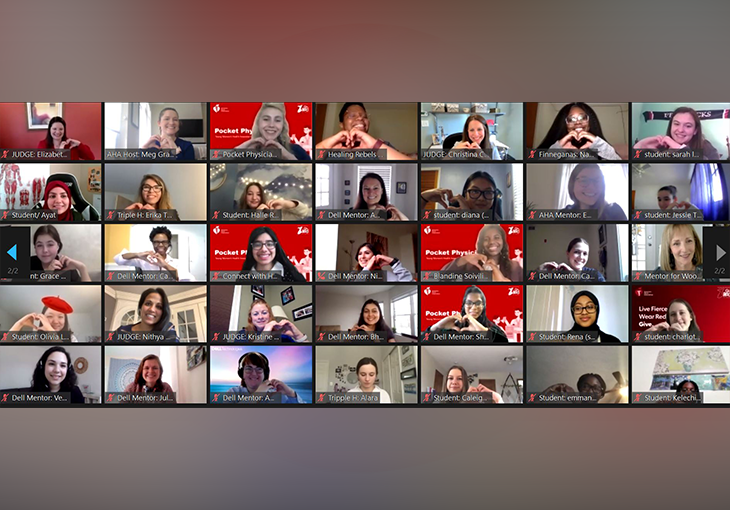Speaking before a panel of women from Greater Boston’s science and technology sectors, high school student Halle Roberts pitched an idea for an app that could help teenage girls better understand their health.
“Often people don’t have a comfortable space or a trusted person to talk to about issues of growing up,” Myslik, a student at Tabor Academy in Marion, explained to the panel.
Her app idea – developed with a team of fellow students from other high schools in Massachusetts – would provide young women with credible information about puberty, body image and mental health – topics Myslik and her team members said can be difficult for their peers to research online.
The students were part of the Young Women’s Health Innovator Challenge, an American Heart Association program designed to expose girls and young women to careers in science, technology, engineering and math. The program, which was sponsored by Dell Technologies, saw high school and college students from across the state team up to develop a concept for an app that could improve public health.
Over several months, the students met virtually with each other and a group of mentors from Dell Technologies, who showed them how their ideas could be taken from concept to market. The program concluded with a virtual meeting, in which the teams presented their final projects to the program’s five judges.
The challenge was developed as part of the American Heart Association’s STEM Goes Red initiative, which was launched in 2017. STEM Goes Red is part of Go Red for Women, an AHA campaign that aims to increase women’s heart health awareness.
Jay Blackwell, who leads the American Heart Association’s efforts in Boston, said he hopes STEM Goes Red will result in more women pursuing STEM degrees, as well as help close the gender gap in STEM jobs.
“We realized that not enough women, particularly women of color, being represented in STEM was a huge miss. We have the ability to help change that,” said Blackwell.
STEM Goes Red started in Boston as day-long event intended to inspire local middle and high school girls to explore STEM outside the classroom while also learning how to take charge of their health and well-being. The COVID-19 pandemic forced the AHA’s Boston office to move the program online, and Dell Technologies, under the leadership of Christina Crowley, a senior vice president at the company, stepped up to conceptualize and execute the Young Women’s Health Innovator Challenge.
Crowley, who chairs the Go Red for Women campaign in Boston, credited the program for also allowing students to make connections with likeminded people during a year when forging new relationships has been difficult.
“The fact that you now have connections not only within your own school, but also other schools, is important,” Crowley told students. “I would encourage you to keep those up.”
Crowley, who served as a judge, was joined on the panel by Dr. Ami Bhatt, of Massachusetts General Hospital; Elizabeth Boudreau, of Amazon; Nithya Desikan, of the UF Herbert Wertheim College of Engineering; and Kris Biagiotti-Bridges, of Dell Technologies. They judged three teams of high school students and three teams of college students.
“I can’t really tell who was the high school team, everyone kept raising the bar,” said Desikan, after the presentations concluded.
She credited the students for their “vulnerability and bravery” in tackling what she deemed “scary subjects” like mental health, heart disease and the pandemic.
“I really think bravery and vulnerability are what is going to change stigmas and raise awareness, and you’re going to be the ones leading the charge,” Desikan said.
The winning high school team consisted of students from Westborough High School, Worcester Technical High School, Weymouth High School and North High School in Worcester. They conceptualized an app that would make it easier for older adults to schedule appointments to get the COVID-19 vaccine, as well as provide information to questions they may have about the vaccination and the coronavirus.
Two college teams took first place honors.
One winning college team consisted of students from UMass Amherst, UMass Lowell and Merrimack College in North Andover. They pitched an idea for an app that would allow users to input health data that could determine whether they are at risk for a heart attack. The other winning team consisted of students from UMass Dartmouth. They pitched an idea for an app that would help college students with depression and anxiety by connecting them to campus mental health resources and providing them with activities to boost their mental health.
Students from the winning teams received a laptop as a prize.
At the conclusion of the program, the students credited the American Heart Association and Dell Technologies for giving them insights into the possibilities and potential they possess to have an impact in STEM.
“I really liked that we worked with students from other majors,” said Collette Soucy, who attends UMass Lowell. “When you go into the field, not everyone you worked with will have majored in what you majored in. It helps you gain other perspectives.”
Annie Soup, a fellow UMass Lowell student, also credited the program for allowing her to make connections with students she otherwise would never have met.
“Having to work with people who think differently, it was a really great experience,” she said.

